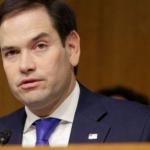US Lawmakers Predictably Take Aim at Petro

Democratic United States Senator Bob Menendez and his Republican counterpart, Marco Rubio, have co-authored a letter denouncing Venezuela's newly-launched cryptocurrency, the Petro, and requesting that the Treasury Department closely monitor its progress. The lawmakers also made suggestions on the measures the agency can take to undermine the success of the digital currency, which has raised over US $1 billion for the South American country since it was launched on Tuesday.
During a hearing convened by the Senate Committee on Banking, Housing and Urban Affairs earlier this month, Menendez also made his intention to subvert the Petro in any way he can clear. Jay Clayton, Securities and Exchange Commission chairman, and Christopher Giancarlo, Commodity Future Trading Commission chairman, declined to respond whether their agencies could undercut the Petro, Giancarlo assured that his “would certainly look at” the cryptocurrency to guarantee that it doesn't swindle U.S. buyers.
Meanwhile, the U.S. Treasury Department had issued a statement on Petro in January. It read that “a currency with these characteristics would appear to be an extension of credit to the Venezuelan government" – a measure forbidden by U.S. sanctions - and that "U.S. persons that deal in the prospective Venezuelan digital currency may be exposed to U.S. sanctions risk."
In reference to the Petro, a spokesperson for Menenedez said: "We continue to look for ways to prevent the Maduro regime from brazenly evading U.S. sanctions and plan to follow up with the Department of Treasury following their issuing of these guidelines."
Venezuelan President Nicolas Maduro has said the goal of the Petro is to combat sanctions and the "economic war" waged by the U.S. government and its junior partners against his country and advancing "on issues of monetary sovereignty, to make financial transactions and overcome the financial blockade."
The launch of the Petro was announced in December. It is regulated by the Superintendence of Cryptocurrencies and Related Activities, as well as the Blockchain Observatory.
Russia and Iran have expressed interest in developing their own digital currencies to help combat U.S.-imposed sanctions, following this week's successful launch of Venezuela's first cryptocurrency. Mohammad-Javad Azari Jahromi, head of Iran's Ministry of Information and Communications Technology, said the test model for a "cloud-based digital currency" is currently under development and will be submitted to the Iranian bank system soon.
The Iranian official announced the move following a meeting with the state-owned Post Bank of Iran on Wednesday, according to NPR.

Meanwhile, Venezuelan Financial Minister Simon Zerpa Delgado was in Russia this week, where he spoke with officials about strengthening collaboration and about the Latin American nation's newly launched cryptocurrency.
En esta reunión hemos pasado revista a la cooperacion económica y financiera entre ambos países, con énfasis en el nuevo criptoactivo de Venezuela: El Petro. Entregamos al Min. Siluánov información actualizada de nuestra criptomoneda. pic.twitter.com/BYSFZvIdaf
— Simón Zerpa Delgado (@SimonZerpaD)
Maduro said: "We have taken a giant step into the 21st Century... We are on the world's technological vanguard."
